
Rolipram, a drug that boosts activity in the brain’s “garbage disposal” system, can decrease levels of toxic proteins associated with Alzheimer’s disease and other neurodegenerative disorders and improve cognition in mice, a new study by neuroscientists has found.
Rolipram causes nausea, but similar drugs do not, and could be tested in clinical trials quickly, the researchers say.
“This has the potential to open up new avenues of treatment for Alzheimer’s and many other neurodegenerative diseases,” said study leader Karen E. Duff, PhD, professor of pathology and cell biology at Columbia University Medical Center (CUMC) and New York State Psychiatric Institute (NYSPI).
To remain healthy, brain cells must continually clear out old, worn, or damaged proteins. This task is performed by a small molecular called the proteasome, which works like a kitchen garbage-disposal system, grinding up the old proteins so they can be recycled into new ones.
However, in neurodegenerative diseases such as Alzheimer’s, Parkinson’s, and Huntington’s, proteins tagged for destruction accumulate in the brain’s neurons. This suggests that the cell’s proteasomes are impaired.
The cause for this: tau; a protein that accumulates in Alzheimer’s and other brain diseases, sticks to the proteasome and jams up the protein garbage-disposal process, the researchers first discovered (using a genetically engineered mouse).
In the new research, administering rolipram activated the proteasome and restored protein disposal. The drug also improved memory in diseased mice to levels seen in healthy mice.
Rolipram has been tested before in mice, and was shown to improve memory. But the new research shows a previously unknown function of the drug: it produces a physical change in the proteasome and increases its activity.
Duff says we still don’t know exactly which form of a particular protein is toxic to the brain, which has made it difficult to develop drugs to treat neurodegenerative diseases. “In Alzheimer’s disease, the problem is compounded because several types of abnormal protein can accumulate in a person’s brain, including amyloid, tau, alpha-synuclein, and TDP43.
However, the researchers think that “a well-functioning proteasome will be able to clear out everything at once,” she says, including Alzheimer’s, frontotemporal degeneration, Huntington’s, and Parkinson’s.
